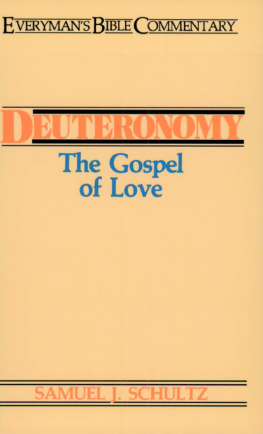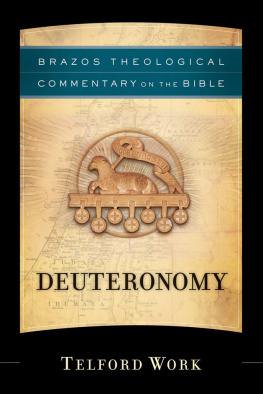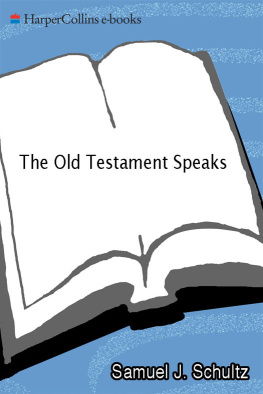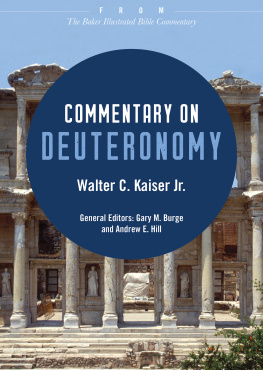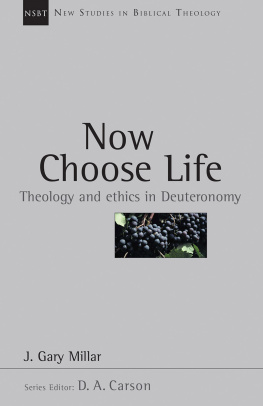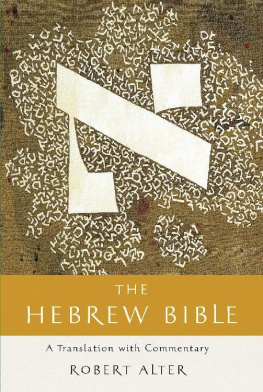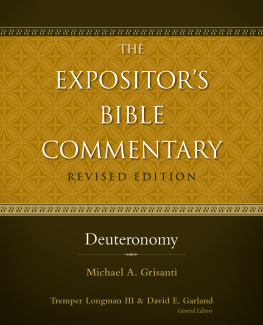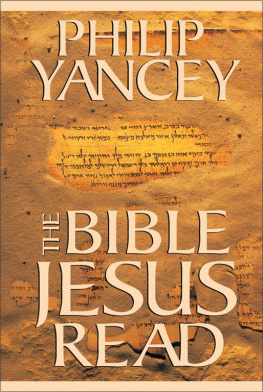All rights reserved. No part of this book may be reproduced in any form without permission in writing from the publisher, except in the case of brief quotations embodied in critical articles or reviews.
We hope you enjoy this book from Moody Publishers. Our goal is to provide high-quality, thought-provoking books and products that connect truth to your real needs and challenges. For more information on other books and products written and produced from a biblical perspective, go to www.moodypublishers.com or write to:
DOES THE PENTATEUCH SUGGEST to you primarily the idea of law? Do you think of Moses as the lawgiver in contrast to Jesus as the one offering love and grace? Is the God of the Old Testament a God of war, judgment, and wrath, and the God whom Jesus revealed the Father of mercy and the God of love? If so, the following pages offer you some thought-provoking considerations.
The book of Deuteronomy is the most important book in the Old Testament from the standpoint of God's revelation to man. For years in his teaching of Old Testament survey, the author made only brief references to Deuteronomy as a book which merely reviews or repeats what precedes in the Pentateuch. Such, however, is not the case. It is one of the books most frequently cited and referred to in the New Testament (nearly two hundred times, according to the Greek New Testament edited by Aland, Black, Metzger, and Wikgren).
Deuteronomy represents the core of what God revealed to Moses at Mount Horeb. From the knowledge of his own experience and the failures of one generation of Israelites who had literally been redeemed from Egyptian bondage, Moses here summarizes, with a life-and-death perspective for the new generation, that which is significant and crucial to their welfare.
The word love is at the heart of the message. Neither a list of dos and don'ts, nor law, nor legalism, nor rules for living, nor good works, nor even a high moral standard was primarily in focus. Basic to all of these was a vital relationship with Goda relationship of love. Out of this love relationship issued all other considerations that were important to man.
Love for man was initiated by God and did not come in response to human action or activity. Although God's tender care had been bestowed upon all mankind, God's love for Israel began with His choice of Abraham, Isaac, and Jacob. God's love was manifested to the entire nation through their miraculous deliverance from Egypt.
As a recipient of God's love, which was evident in His redemption and constant care, the Israelite was expected to respond with wholehearted love and devotion. This response tapped all the resources of his entire beingheart, soul, mind, and strength. This love and devotion was exclusive. No other gods could be allowed or tolerated in such a relationship.
Out of this unique relationship with his God, the Israelite was to express his love horizontally to his neighbor. Only as he experienced being loved by God was he qualified to extend love to his neighbor. A keen realization of God's love provided the wellspring that enabled the Israelite to love his fellowman in the true sense.
It is this vertical and horizontal love relationship that Jesus pinpointed as the essence of all that God required of man to obtain eternal salvation (cf. Mt 22:35-40; Mk 12:28-34; Lk 10:25-28). The expert in the Mosaic law representing the Pharisees concurred with Jesus that the law of love was more important than all other considerations.
It was in the book of Deuteronomy that Jesus and the religious leaders found the core of God's revelation to man in written form. Jesus also pointed out that this represented the essence of all that is written in the law and the prophets (the Old Testament). Consequently, we do well to study this book which provides us insight and understanding of the context in which this divine concept of love was revealed through and stated by Moses.
AUTHORSHIP
In current scholarship two basic viewpoints prevail concerning the authorship of Deuteronomy. According to some scholars this book was written during the seventh century B.C.; many others recognize Moses as the author, thus placing it much earlier.
A LATE COMPOSITION
As early as 1805 a German scholar by the name of De Wette proposed the theory that the book of Deuteronomy was written shortly before the time of Josiah and used as the law-book for religious reforms. Wellhausen gave classic expression to this idea by proposing that a prophet compiled Deuteronomy 12-26 about 630 B.C. with the intention of centralizing worship in Jerusalem. According to this theory this book was deposited in the temple and then discovered by Hilkiah the high priest.
The book of Deuteronomy in part, if not the whole, was identified as the D document. About 200 B.C. this document was combined with two narrative documents known as J and E (dated respectively about 950-850 and 750 B.C.) and the priestly document known as P (dated about 450 B.C.) to form the present Pentateuch. From the standpoint of literary partition, J was so designated because of its use of the divine name of Yahweh (Jahveh in German) for God, whereas E was identified by the use of the term Elohim. The D document was hortatory, and the P document was primarily concerned with worship.
The J document, according to this theory, was written in the wake of the great Hebrew kingdom that flourished in the Solomonic era. Geographically it was associated with Judah, which continued to be dominated by the Davidic dynasty after the secession of the Northern tribes in 931 B.C. The E document emerged as written literature during the peak of economic and political prosperity in the reign of Jeroboam II about 800-750 B.C. Recently scholars favor the tenth century as the preferable date for the J and E documents, J being written shortly before the death of Solomon and E at the beginning of the Northern Kingdom.
This theory has been modified so that Deuteronomic traditions began with the sacred and cultic festivals during the premonarchical era and were adapted and modified later by the prophetic circles. The basic book of Deuteronomy was written during the seventh century when Manasseh ruled in Jerusalem, and was completed after 586 B.C. when it became the introduction to the Deuteronomy-2 Kings corpus of Israelite history. Subsequently it was expanded editorially when it was added to the Genesis-Numbers corpus to form the Pentateuch. Moses had nothing to do with what is reported in Deuteronomy, nor did he have any part in the literary composition of the book.
MOSES AS AUTHOR
Modern scholars such as E. J. Young, Gleason L. Archer, and R. K. Harrison, who recognize the Old Testament in its unreconstructed form as a reliable and trustworthy record, hold with the older Christian and Jewish tradition that the book of Deuteronomy offers an accurate record of Moses' addresses to the Israelites on the Plains of Moab. Although he may have had scribes writing for him who may have provided geographical explanations and the account of his death, Moses was essentially responsible for its writing, so that he is the author of this book as well as the rest of the Pentateuch.
Internal claims within Deuteronomy indicate that these speeches were delivered orally in the last month of the forty-year period of Moses' leadership (1:3) and preserved in written copies (31:9, 24; cf. 31:24-26).

